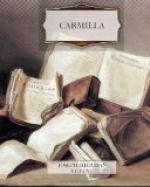The sun had now set, and it was twilight by the time I had returned the General’s letter to my father.
It was a soft clear evening, and we loitered, speculating upon the possible meanings of the violent and incoherent sentences which I had just been reading. We had nearly a mile to walk before reaching the road that passes the schloss in front, and by that time the moon was shining brilliantly. At the drawbridge we met Madame Perrodon and Mademoiselle De Lafontaine, who had come out, without their bonnets, to enjoy the exquisite moonlight.
We heard their voices gabbling in animated dialogue as we approached. We joined them at the drawbridge, and turned about to admire with them the beautiful scene.
The glade through which we had just walked lay before us. At our left the narrow road wound away under clumps of lordly trees, and was lost to sight amid the thickening forest. At the right the same road crosses the steep and picturesque bridge, near which stands a ruined tower which once guarded that pass; and beyond the bridge an abrupt eminence rises, covered with trees, and showing in the shadows some grey ivy-clustered rocks.
Over the sward and low grounds a thin film of mist was stealing like smoke, marking the distances with a transparent veil; and here and there we could see the river faintly flashing in the moonlight.
No softer, sweeter scene could be imagined. The news I had just heard made it melancholy; but nothing could disturb its character of profound serenity, and the enchanted glory and vagueness of the prospect.
My father, who enjoyed the picturesque, and I, stood looking in silence over the expanse beneath us. The two good governesses, standing a little way behind us, discoursed upon the scene, and were eloquent upon the moon.
Madame Perrodon was fat, middle-aged, and romantic, and talked and sighed poetically. Mademoiselle De Lafontaine—in right of her father who was a German, assumed to be psychological, metaphysical, and something of a mystic—now declared that when the moon shone with a light so intense it was well known that it indicated a special spiritual activity. The effect of the full moon in such a state of brilliancy was manifold. It acted on dreams, it acted on lunacy, it acted on nervous people, it had marvelous physical influences connected with life. Mademoiselle related that her cousin, who was mate of a merchant ship, having taken a nap on deck on such a night, lying on his back, with his face full in the light on the moon, had wakened, after a dream of an old woman clawing him by the cheek, with his features horribly drawn to one side; and his countenance had never quite recovered its equilibrium.
“The moon, this night,” she said, “is full of idyllic and magnetic influence—and see, when you look behind you at the front of the schloss how all its windows flash and twinkle with that silvery splendor, as if unseen hands had lighted up the rooms to receive fairy guests.”




